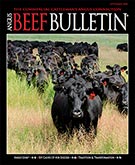Avoid Extra Heats Due to Heat
Keep your cows bred through the heat of summer.
Cattle producers go to great lengths to do whatever it takes to get their cows bred. What about after they are bred? Keeping a cow bred, especially during the summer months, can be equally as challenging.
Typically, if a fertile bull breeds cows at the correct time, fertilization rates should reach nearly 100%. However, normal single-service conception rates run anywhere from 60% to 80%. The 20%-40% difference must come from embryonic or fetal loss. Loss of pregnancy can result in longer calving windows, lower weaning weights and less profitability for producers.
Oklahoma State University conducted some of the first research on the implications of heat stress on pregnancy rates. Those studies found that when cattle were bred at cooler temperatures, but then exposed to moderate and severely hot temperatures, their pregnancy rates were decreased by as much as 50%. Furthermore, they found that the surviving fetuses were smaller in heat-stressed cows and were more likely to be lost later in pregnancy.
Cattle can experience heat stress once the ambient temperature outside reaches 70° F or higher. This means that their upper critical limit for temperature is lower than that of humans. Humidity can accelerate the effects of heat stress because of the cows’ inability to dissipate heat effectively. Therefore, stress can increase pregnancy loss well into the second and third trimester.
For spring-calving cows, calves are weaned, and cows are worked in what are typically the hottest months of the year. In the case of fall calvers, these females may calve earlier than expected due to prolonged periods of heat and drought during the third trimester.
Be sure to give special considerations to bulls, as well, during the summer months. Heat stress can affect spermatogenesis (sperm production) and won’t show up until 45-60 days after heat stress.
Other factors such as fescue and fescue toxicosis can compound the effects of heat stress. The endophyte found in fescue, which can ultimately lead to fescue toxicosis if proper management isn’t implemented within an operation, limits a cow’s ability to dissipate heat because it reduces blood flow to the skin.
If cows and heifers are exposed to diseases they don’t have the proper immune defenses against, the addition of stress from excessive heat can leave them virtually defenseless against sickness. Heat stress decreases grazing and feed intake. In drought situations dust and malnutrition will result in increased respiratory illnesses and potential loss of pregnancy.
Keep cows bred
To help minimize the results of heat stress and help keep cows bred, producers can provide a multitude of management techniques to lessen the effects of heat stress.
- Always provide enough cool, clean drinking water. High temps can double water intake. Increased urine output can deplete bodily mineral stores, so be sure to provide a high-quality mineral source at all times.
- Ample shade will provide relief from heat stress without too many animals gathering in a small area and compromising air flow.
- Make sure all buildings have adequate ventilation, especially if cows are confined.
- Wetting via sprinklers or hoses can effectively cool cattle. However, pay attention to droplet size. Misters just add more humidity to the air.
- Good fly control can go a long way. To combat flies, cattle will bunch and lower air circulation, resulting in elevated heat stress.
- Avoid working cattle during the hottest hours of the day. The earlier in the day, the better.
- Depending on the region of the country in which you reside, incorporating more heat-tolerant genetics can improve the end-product value or overall profitability. Early hair shedding is a good indication of heat tolerance.
One way to help your cow herd beat the effects of heat stress and help keep them cool is as simple as offering a high-quality supplement like VitaFerm® HEAT®. This free-choice vitamin-and-mineral supplement for beef cattle on pasture helps prevent heat stress during temperatures of 70° and above, or anytime cattle are grazing fescue.
It contains organic copper and zinc for increased bioavailability to improve pregnancy maintenance, immunity and hoof quality. Capsaicin helps maintain circulation to support animal performance in both heat and fescue situations. Proven to lower body temperature, it can improve conception rates by maintaining pregnancy. It also contains garlic, a natural insect repellent.
Producers invest a lot of time and resources to get their cows ready for the breeding season. Significant heat stress can result in loss of pregnancy. A good vitamin-mineral supplement can help lessen the negative impacts of heat stress and help keep your cows bred during the summer heat!

Editor’s Note: Shelia Grobosky is a public relations specialist for BioZyme Inc.






